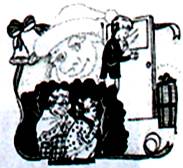严重创伤病人麻醉诱导的关键之一是必须首先控制呼吸道,其措施包括()。
A.放置粗胃管吸引
B.诱导前使用西咪替丁
C.表面麻醉清醒气管插管
D.采取快速静脉诱导,同时压迫环状软骨
E.用硫喷妥钠诱导
参考答案:A, B, C, D
严重创伤病人麻醉诱导的关键之一是必须首先控制呼吸道,其措施包括()。
A.放置粗胃管吸引
B.诱导前使用西咪替丁
C.表面麻醉清醒气管插管
D.采取快速静脉诱导,同时压迫环状软骨
E.用硫喷妥钠诱导
参考答案:A, B, C, D
 It snowed again.My seventh Christmas was round the corner.I dreamed of getting the present from Father Christmas until my elder sister dropped the bomb.“There is no Father Christmas.” I ran to my grandmother’s house, for she always told the truth.Grandmother was at home. I told _1_everything.“No Father Christmas?”she was a little_2_.“Don’t belive it.Put on your coat,and let’s go.” “Go?Where,Grandma?” I asked. “Kerby’s Store.” As we walked through its doors. Grandma handed me the dollars and said.“Take the _3_and buy something for someone who needs it.I’ll wait for you in the car.”Then she turned and walked out of the Kerby’s. For a few seconds I just stood there,holding the money,wondering_4_to buy,and who to buy it for. I thought of_5_I knew my family,my friends,my neighbours…I suddenly thought of Bobbie Decbar, a _6_with bad breath and messy hair.He sat right behind me_7_Mrs. Polack’s class. Bobbie_8_went to any party during the winter.His mother always wrote a note, telling the teacher that he had a cough, _9_we all knew that he didn’t have a cough,and he didn’t have a coat.I decided to buy Bobbie a red warm coat_10_he would like. That evening, grandma helped me wrap the coat in Christmas paper and ribbons, and_11_“To Bobbie.From Father Christmas”on it.Grandma told me Father Christmas never let people know that he _12_ them.Then she drove me over to Bobbie’s home ,telling that I was helping Father Christmas_13_ the presents. Grandma parked the car along the street.and we hid behind the trees near Bobbie’s home .Then Grandma said to me.“All right , Father Christmas get going.” I took a deep breath,rushed to his front door,put the present down_14_the door,rang the doorbell and flew back to the safety of the _15_and Grandma.We waited breathlessly in the dark for the front door to open.Finally it did and there stood Bobbie. That night ,I realized that Father Christmas was alive and well.and we were on his team.
|